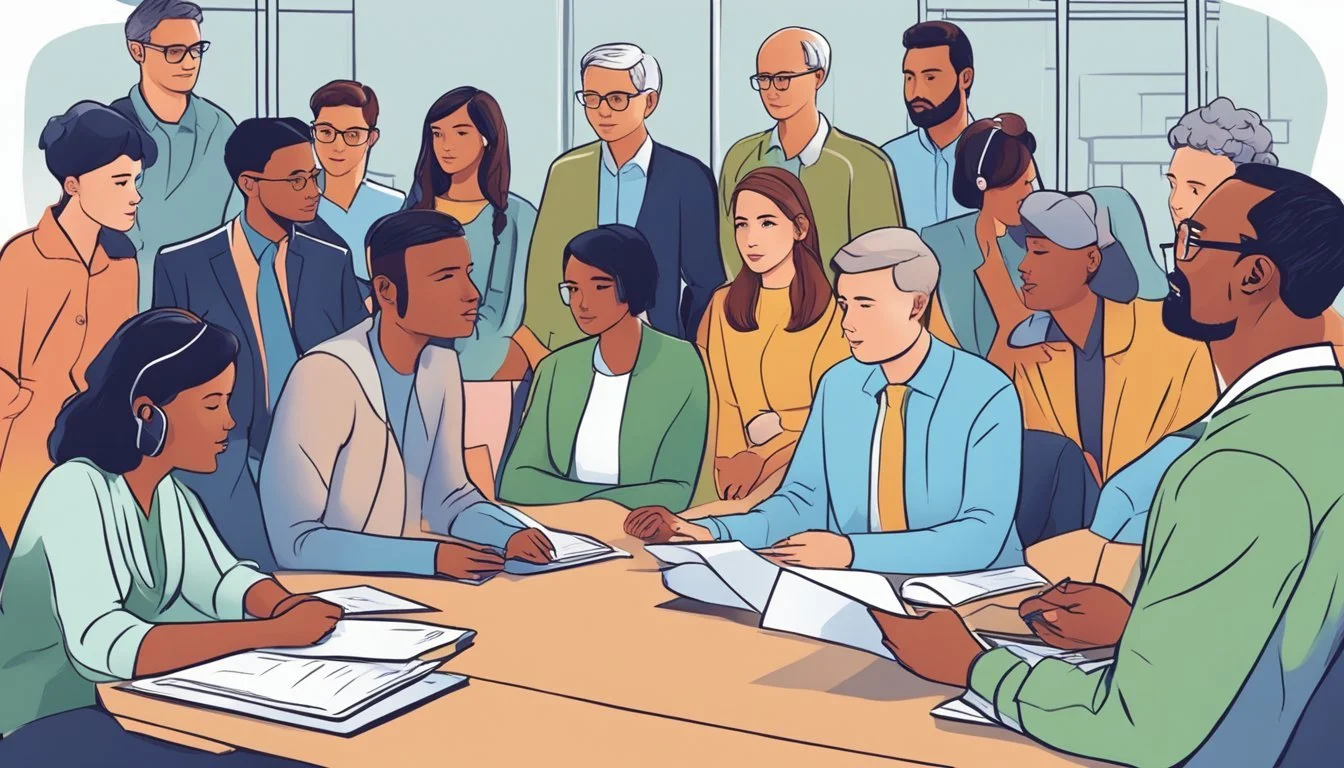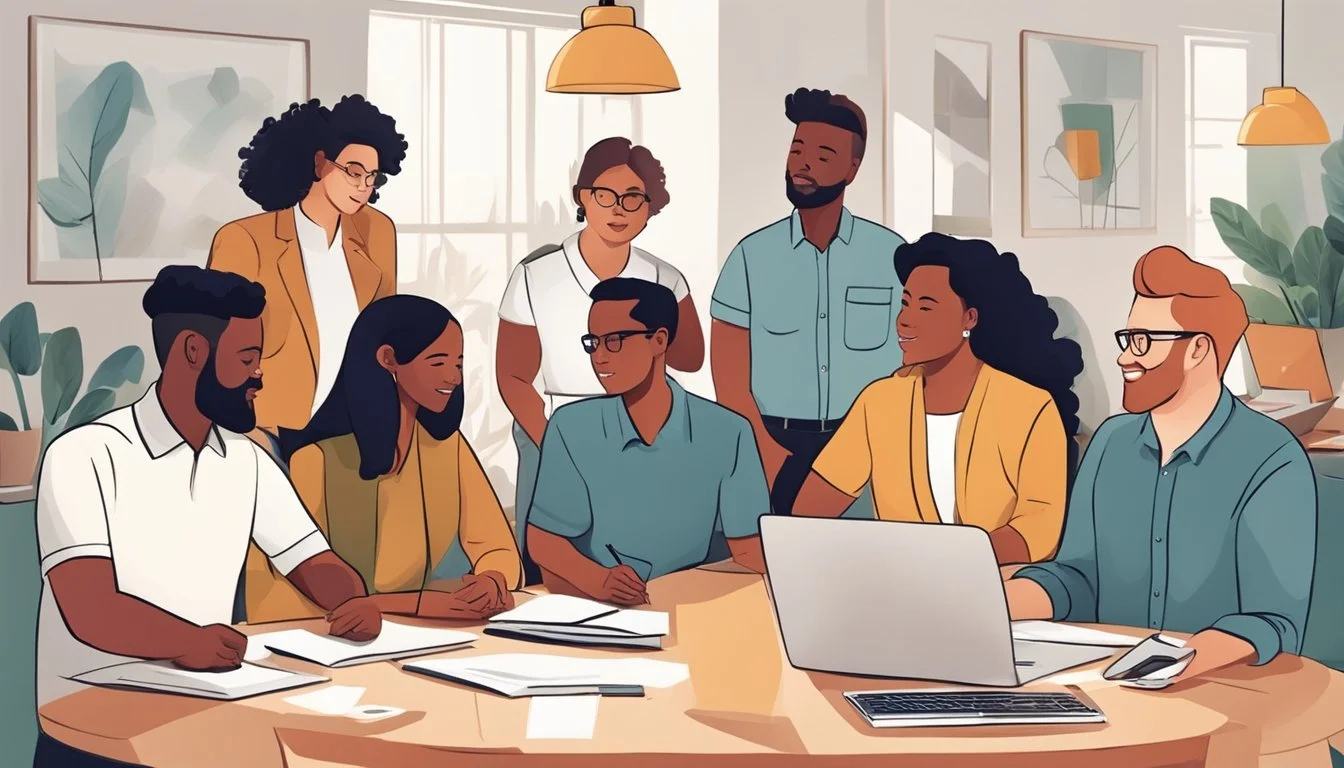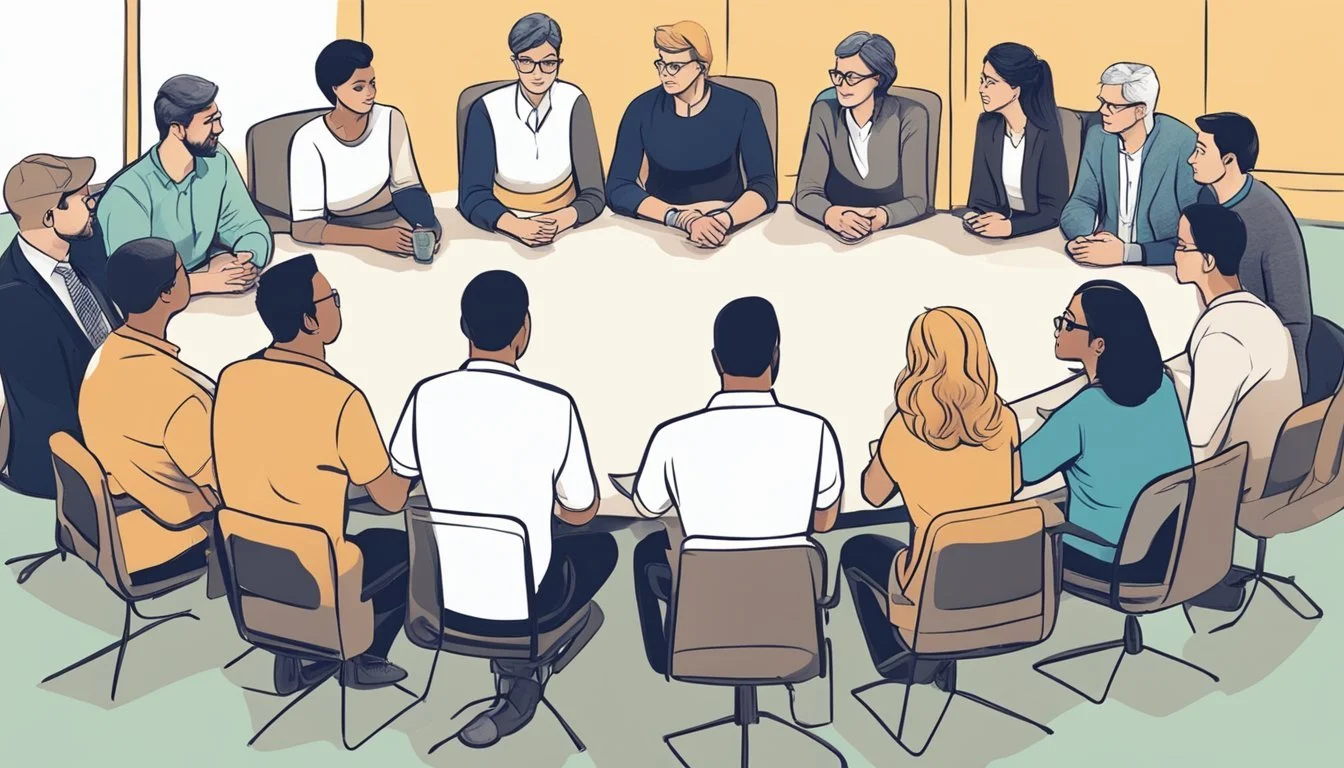13 Signs You're a Highly Cooperative Person
Traits That Enhance Team Success
Being a highly cooperative person encompasses a range of traits and behaviors that facilitate effective teamwork and positive interactions. This article explores the indicators that highlight a person's capacity to work harmoniously with others, fostering a collaborative environment.
By identifying these signs, individuals can better understand their own strengths and opportunities for growth in team settings. Recognizing these characteristics can lead to more meaningful contributions and improved relationships in both personal and professional contexts.
1) You listen actively
Active listening is a core trait of a cooperative person. It involves fully focusing on the speaker and demonstrating genuine interest in their message. This skill fosters better communication and stronger relationships.
A cooperative individual uses active listening techniques. These include maintaining eye contact, nodding in acknowledgment, and providing verbal affirmations without interrupting.
They also reflect on what is being said. By summarizing or paraphrasing the speaker's words, they ensure understanding and show empathy. This practice helps in clarifying any ambiguities and confirms their attentiveness.
Furthermore, an active listener pays attention to non-verbal cues. These cues can include body language, facial expressions, and tone of voice. Recognizing these subtleties enables them to grasp the full context of the conversation.
Lastly, when responding, they do so thoughtfully. Their responses are relevant and considerate, which creates a supportive environment. Such interaction signifies respect and acknowledgement of the speaker's perspective.
Being an active listener is essential for anyone who aims to contribute positively in cooperative settings. By harnessing these skills, they promote a more collaborative and understanding atmosphere.
2) You seek consensus
A highly cooperative person values building consensus within a group. They prefer collaboration over competition, aiming to harmonize differing opinions. This focus on unanimity ensures that everyone feels heard and valued. It’s a trait that fosters a more inclusive environment, whether at work or in social settings.
Individuals who seek consensus tend to facilitate discussions that consider all viewpoints. They are skilled in mediating conflicts, ensuring that decisions reflect the collective input. Their approach promotes mutual respect and understanding, leading to more sustainable and agreeable outcomes.
These people often utilize active listening and effective communication to ensure alignment among team members. By prioritizing the group's success over individual agendas, they help create a unified, cohesive team dynamic. This approach not only advances group goals but also strengthens interpersonal bonds and trust.
For more insight on a cooperative personality, you can explore the topic further at Know Your Archetypes.
3) You value others' opinions
A highly cooperative person recognizes the importance of diverse perspectives. They understand that each team member brings unique insights and experiences to the table. This openness to different viewpoints fosters a more inclusive and creative environment.
By valuing others' opinions, cooperative individuals promote a culture of respect and collaboration. This helps in finding balanced solutions to problems and prevents groupthink. It also encourages team members to share their thoughts without fear of being dismissed.
They actively listen to what others have to say and make an effort to incorporate these insights into decision-making processes. This approach not only builds trust but also enhances the overall effectiveness of the group.
In practice, valuing others' opinions might involve asking for feedback, showing appreciation for contributions, and being willing to adjust one's stance based on new information. It reflects a commitment to shared success and collective growth.
Cooperative people view differing opinions as opportunities rather than obstacles. They remain open-minded and adaptable, which strengthens team dynamics and drives successful outcomes. This quality makes them reliable and respected team members in any collaborative setting.
For more on the characteristics of a cooperative personality, you can refer to this detailed explanation.
Additionally, research suggests that groups with diverse backgrounds are more creative, as highlighted in this article.
4) You maintain open communication
A highly cooperative person prioritizes clear and open communication. They ensure all parties feel heard and valued, which promotes a positive and productive environment.
They use active listening techniques to understand others' perspectives. This skill helps them respond thoughtfully and maintain a smooth flow of dialogue.
Encouraging open communication also means being transparent about their own thoughts and feelings. They share necessary information without withholding it, which fosters trust among team members.
Using positive feedback is another indicator. This contributes to a more supportive atmosphere and reinforces constructive behavior.
Lastly, they adapt their communication style to suit different individuals. Understanding and respecting others’ preferences makes interactions more effective and comfortable for everyone involved.
Open communication helps to create strong bonds and mutual respect within teams. This practice is crucial for successful collaboration and achieving common goals together.
5) You remain calm under pressure
Highly cooperative people often exhibit the ability to stay calm during stressful situations. This trait is essential for effective teamwork, as it allows them to manage crises without panicking.
Such individuals typically possess strong emotional control, which helps them think clearly and make rational decisions. This calm demeanor can positively influence their peers, leading to a more composed and productive team environment.
People who remain calm under pressure often display resilience and a steady attitude. They are less likely to succumb to stress, making them reliable in emergencies or high-stake scenarios. This reliability strengthens trust among team members, enhancing overall cooperation.
Adaptability also plays a crucial role. Those who stay calm are usually comfortable with uncertainty and can quickly adjust to changing circumstances. This flexibility helps them navigate unexpected challenges efficiently.
Some traits that contribute to calmness include self-awareness and a focus on solutions rather than problems. By concentrating on actionable steps, they avoid getting overwhelmed, ensuring that projects stay on track even during tough times.
Individuals who maintain composure can diffuse tense situations and negotiate conflicts smoothly. Their ability to keep a level head ensures better outcomes and fosters a cooperative work culture. For more insights into these traits, you can explore personality traits of people who remain calm under pressure.
6) You are adaptable
Being adaptable is a hallmark of a highly cooperative person. They are comfortable with change and uncertainty, making it easier to collaborate in dynamic environments. This flexibility enables them to adjust their approach according to the needs of the team, ensuring smooth teamwork and productivity.
Adaptable individuals exhibit resilience and are quick to pivot when faced with new challenges or information. This trait is crucial in collaborative settings where conditions often shift unexpectedly. The ability to stay calm and collected under pressure helps them to lead by example and support their teammates effectively.
Moreover, adaptable people are open to feedback and are willing to make adjustments based on constructive criticism. This openness fosters a culture of continuous improvement and mutual respect. Their willingness to learn and grow benefits the entire team by encouraging a proactive and positive work environment.
An adaptable person is also skilled at finding creative solutions to problems. They view obstacles as opportunities to innovate rather than barriers to progress. This forward-thinking mindset is invaluable in cooperative efforts, where diverse ideas and approaches are often necessary to achieve common goals.
According to Bolde, adaptability involves resilience, flexibility, and a sense of calm. These traits allow adaptable individuals to navigate life's unpredictability with poise, significantly enhancing their cooperative capabilities.
7) You offer constructive feedback
A highly cooperative person provides feedback that is constructive and actionable. They understand the importance of clarity and specificity, ensuring that their feedback addresses particular actions rather than generalities.
Providing specific examples is crucial. Instead of saying, "You need to improve your performance," they might say, "The report you submitted last week was missing key data points.”
Constructive feedback from cooperative individuals is always delivered with empathy. They aim to support and encourage improvement rather than criticize. This approach fosters a positive environment where everyone feels valued.
Being constructive means they focus on the behavior and its impact, not the person. For instance, "When meetings run late, it affects our project timelines" is a more cooperative approach than making it personal.
Cooperative people often seek a calm and conducive environment to deliver feedback. If emotions run high, they are willing to reschedule the conversation until both parties are ready for a productive discussion.
Additionally, they declare their intentions clearly. They might state, "I aim to help us work better together," ensuring that their feedback is perceived as a collaborative effort rather than an attack.
By offering constructive feedback, they contribute to a more effective and harmonious environment. To learn more about offering constructive feedback, check out these examples and tips.
8) You Share Credit for Successes
A highly cooperative person doesn’t hesitate to share credit for successes. They recognize the contributions of their team members and ensure everyone’s efforts are acknowledged. This behavior fosters a supportive environment.
By distributing praise, they build trust and strengthen relationships within the group. It shows their appreciation for the team's collective effort.
Sharing credit also motivates others to continue their hard work. When everyone feels recognized and valued, the team becomes more cohesive and productive.
This trait is particularly crucial in collaborative settings. It demonstrates humility and a genuine investment in the success of others. Instead of seeking personal glory, they focus on the group’s achievements.
For more insights into the significance of cooperation, you can explore the concept of a cooperative personality type. Similarly, understanding how to describe a collaborative person can provide further context.
9) You empathize with others
Highly cooperative people often show a deep ability to empathize with others. This means they pick up on and understand the emotions of those around them. By connecting emotionally, they can offer support and encouragement when needed.
They often take on other people's emotions as their own, feeling deeply invested in others' well-being. This trait helps build strong, trusting relationships. They naturally provide comfort to those in distress.
Their intuition is typically very strong, allowing them to sense unspoken feelings. They might react emotionally to someone else's story, even expressing tears. This intuitive connection fosters a sense of community and mutual understanding among peers.
Being empathetic, they may dislike large crowds and seek alone time to recharge. Spending too much time around others can be draining for them. This need for solitude is a form of self-care that ensures they can continue to support their friends and colleagues effectively.
Empathy also involves actively listening and responding thoughtfully. They pay close attention to what others say and show genuine concern, making the other person feel heard and valued. This attention to detail strengthens cooperative efforts in any group setting.
10) You foster a positive environment
A highly cooperative person always strives to create a positive work environment. They understand the importance of fairness, clear purpose, and employee engagement. These elements enhance loyalty and reduce turnover, which contributes to overall job satisfaction.
They know that flexibility and adaptability are key characteristics of a positive environment. Offering flexible work schedules allows the team to manage changes smoothly. This flexibility helps employees feel less tied down and more empowered.
Creating a safe space for idea sharing is another essential aspect. Employees must feel they can share thoughts without facing judgment or negative consequences. This open atmosphere encourages team members to contribute freely and boosts cooperation.
Communication plays a significant role in a positive work environment. Regular internal newsletters and town hall meetings allow employees to stay informed and feel heard. Knowing they are valued and kept in the loop increases their sense of belonging and motivation.
Additionally, social outings can enhance team bonding. Organizing such events helps build stronger interpersonal relationships among team members. This step further contributes to a cooperative and positive work environment.
11) You Avoid Unnecessary Conflict
A highly cooperative person recognizes the value of maintaining a harmonious workplace. They actively avoid situations that could escalate into unproductive conflicts. This doesn't mean they shy away from all disagreements, but they understand the importance of distinguishing between constructive and unnecessary conflict.
They approach potential disputes with a calm demeanor and focus on finding common ground.
By addressing issues early and respectfully, they help prevent minor disagreements from growing into major problems. Their goal is to facilitate open communication and understanding among team members.
In environments where occasional conflicts are inevitable, they work to mediate and defuse tensions rather than contribute to them.
By maintaining professionalism, they promote a more positive and productive work atmosphere. Managing conflict in a healthy way is key to their approach.
12) You respect diverse viewpoints
Respected individuals understand that different perspectives bring valuable insights.
They recognize that embracing diverse viewpoints can lead to more innovative solutions and better decision-making. By being open-minded, they create an inclusive environment where everyone feels heard.
Respecting diverse viewpoints often involves active listening. It shows patience and a willingness to understand others' experiences and ideas. This approach fosters mutual respect and collaboration.
In a team setting, someone who respects diverse perspectives encourages others to share their thoughts and ideas. This can lead to more creative problem-solving and richer discussions.
They know that diverse teams bring broader perspectives, which enhances creativity and overall effectiveness. This is especially true in environments where collaboration and teamwork are crucial.
By valuing different viewpoints, they help create a supportive and dynamic atmosphere. This not only improves team morale but also boosts productivity and innovation.
13) You lead by example
A highly cooperative person often leads by example. Their actions consistently align with the group's goals and values.
They demonstrate reliability and accountability by fulfilling their own responsibilities effectively. This instills confidence in teammates and motivates them to follow suit.
They also show empathy and consideration, valuing diverse opinions and fostering a collaborative atmosphere. This behavior encourages others to adopt a similar approach.
By maintaining open communication and offering constructive feedback, a cooperative leader improves team dynamics and ensures everyone feels heard. This enables smoother project execution and collective success.
Their ability to resolve conflicts amicably further exemplifies their leadership. They prioritize mutual respect and understanding, which enhances team cohesion and performance.
Understanding Cooperation
Cooperation is a fundamental aspect of human interactions and is crucial for achieving mutual goals. It involves working together harmoniously and can significantly impact personal and professional relationships.
Definition of Cooperation
Cooperation refers to the act of working together towards a common goal. It involves the coordination of efforts and sharing resources to achieve objectives that benefit the group. Key components include communication, mutual respect, and a willingness to collaborate.
A cooperative person is typically communicative, diplomatic, loyal, and reliable. This means they prioritize teamwork and consider the success of their team as paramount.
Key Elements of Cooperation:
Clear communication
Shared goals
Mutual respect
Resource sharing
The Importance of Cooperation in Society
Cooperation is essential for the survival and success of societies. Humans rely on cooperative behavior to tackle complex problems and create innovations.
In history, ventures like the construction of the Channel Tunnel exemplify real-world cooperation, showing how collaborative efforts can result in monumental achievements.
In everyday life, cooperation enhances community well-being and fosters a sense of belonging and purpose. Whether in workplaces, schools, or family units, cooperative dynamics enable individuals to leverage their strengths for collective benefit.
Benefits of Cooperation:
Improved problem-solving
Enhanced social bonds
Greater innovation
Increased productivity
By understanding the nature and importance of cooperation, individuals and societies can better harness the power of collaborative efforts to achieve shared goals.
Psychological Traits of Cooperative People
Cooperative people display several key psychological traits that enhance their ability to work well with others. These traits include strong empathy, proficient communication skills, and effective conflict resolution abilities.
Empathy and Understanding
Empathy is crucial for those who are cooperative. They can put themselves in others' positions, understanding their feelings and perspectives. This trait fosters trust, as others feel seen and valued.
Individuals with high empathy tend to be more aware of nonverbal cues and emotions, assisting in anticipating needs and reactions. This leads to better teamwork and collaboration.
Their empathetic nature also promotes compassion, making them more likely to support and help others in achieving common goals. Empathy strengthens relationships, which are fundamental to cooperative behavior.
Effective Communication
Effective communication is essential for cooperation. Cooperative individuals excel in articulating their thoughts clearly and listening attentively. This two-way communication ensures that all parties understand and respect each other's viewpoints.
Clear communication helps in reducing misunderstandings and misinterpretations. They often use active listening techniques, such as summarizing what the other person has said, to confirm understanding.
By adapting their communication style to suit different audiences, they can engage various stakeholders effectively. This adaptability aids in achieving consensus and driving collaborative efforts forward.
Conflict Resolution Skills
Conflict resolution is another vital trait in cooperative people. They approach conflicts with a problem-solving mindset rather than a confrontational attitude. This approach helps in finding constructive solutions acceptable to all parties involved.
They remain calm and composed under pressure, enabling them to de-escalate potentially volatile situations. Their ability to separate issues from personalities allows them to address the root cause of conflicts without making it personal.
By focusing on common goals and mutual interests, cooperative individuals turn conflicts into opportunities for growth and improvement. This skill is indispensable for maintaining harmony and productivity within any team.
Cooperation in Different Contexts
Cooperation manifests differently depending on the situation. Whether in a professional setting, personal life, or within the community, it involves distinct behaviors and approaches.
Workplace Dynamics
In the workplace, cooperation is essential for achieving collective goals. Effective communication and active listening are key to fostering cooperation among team members. When individuals share their ideas openly and listen to others, it creates a productive environment.
Collaboration tools like project management software and regular team meetings can enhance this cooperative atmosphere. Assigning tasks based on individual strengths and encouraging feedback helps ensure everyone is contributing effectively. Recognizing and rewarding cooperative efforts can further promote a culture of teamwork.
Family and Relationships
Cooperation in family and personal relationships revolves around understanding and compromise. Sharing responsibilities and making joint decisions are fundamental aspects of this cooperation. Active listening and empathy play crucial roles, allowing everyone to feel valued and heard.
For example, planning family activities or managing household chores requires input from all members. This collaborative approach not only makes tasks more manageable but also strengthens bonds. Trust and respect are foundational, fostering an environment where cooperation can thrive.
Community Involvement
Involvement in the community often requires a higher level of cooperation, as it involves diverse groups working towards common goals. Whether organizing local events, participating in volunteer activities, or addressing community issues, cooperation is pivotal.
Active participation and clear communication are essential for effective community involvement. Building networks and forming alliances with other community members amplify the impact of individual efforts. Engaging in discussions and collaborating on solutions ensures that the community benefits as a whole.
In all these contexts, the essence of cooperation lies in working together towards common objectives, appreciating diverse perspectives, and fostering an environment of mutual support and respect.















